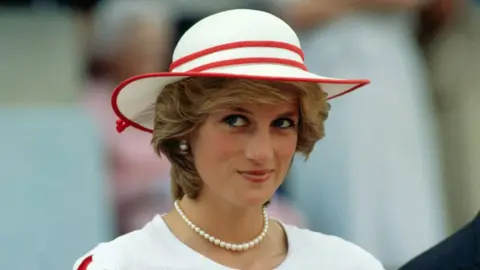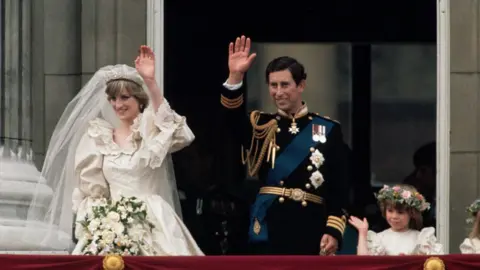Princess Diana interview: What did Martin Bashir and the BBC do?
 Getty Images
Getty ImagesThe BBC has made an "unconditional apology" over the way it obtained an interview with Diana, Princess of Wales in 1995.
An independent inquiry by Lord Dyson, a former senior judge, found journalist Martin Bashir used deception to secure the interview and then lied to BBC managers.
What did Princess Diana tell Martin Bashir?
Martin Bashir's interview with Princess Diana, broadcast by Panorama in late 1995, was a huge scoop for the BBC. Never before had a serving royal spoken in such candid terms about life in the Royal Family.
In the interview, Princess Diana:
- admitted having an affair
- said Prince Charles's affair with Camilla Parker Bowles (now his wife, the Duchess of Cornwall) had made her feel worthless
- spoke of there being "three of us" in the marriage
- said she had had bulimia and self-harmed
- suggested Prince Charles might not be able to adapt to being king
- said Prince Charles's staff were waging a campaign against her
More than 20 million people watched the interview and it caused huge controversy.
Shortly afterwards, the Queen wrote to Prince Charles and Princess Diana telling them to divorce.
Why was the interview controversial?
Questions about the manner in which interview was secured, started to be asked within a short time of its airing.
A graphic artist working for the BBC said he had been asked by Martin Bashir to produce fake bank statements.
These appeared to show payments by a newspaper group to a former member of staff of Earl Spencer, Princess Diana's brother.
The Dyson report says this was to gain Earl Spencer's confidence, so he would introduce Mr Bashir to Diana.
When questioned by BBC bosses, Mr Bashir admitted having the statements mocked up, but repeatedly denied showing these documents to Earl Spencer.
The report says Mr Bashir "lied and maintained the lie until he realised that it was no longer sustainable. This was most reprehensible behaviour which casts considerable doubt on his credibility generally".

Who was Princess Diana?
Princess Diana was the mother of Prince William and Prince Harry.
She married the Prince of Wales, the heir to the throne, in London's St Paul's Cathedral, in 1981.
 Getty Images
Getty ImagesThe couple separated in 1992 and divorced in 1996.
She died in a car crash in Paris a year later, along with her companion Dodi Fayed, and their driver, Henri Paul.
They had been speeding away from photographers following the car, when Mr Paul lost control and smashed into a concrete pillar.
Analysis indicated he had significant levels of alcohol in his blood at the time.

What does the report say about the BBC?
The BBC comes in for strong criticism in the Dyson report.
After the forged bank statements were revealed by the Mail on Sunday newspaper in early 1996, an internal BBC inquiry cleared Mr Bashir, Panorama and BBC News of wrongdoing.
The director of news who conducted the inquiry was Tony Hall, now Lord Hall, who later became the BBC director general.
However, the Dyson Report says this inquiry was inadequate because it failed to interview Earl Spencer - something it calls "a big mistake".
It says it did not treat Mr Bashir's account with "necessary scepticism and caution", given that he admitted faking bank statements (itself a serious breach of BBC rules) and could give "no credible reason" why.
Lord Hall - who left the BBC in 2020 - admitted that he was wrong to give Martin Bashir the "benefit of the doubt" at the time of the investigation. He has since resigned from his job as chairman of the National Gallery.
The Dyson report also says the BBC covered up facts about how Mr Bashir secured the interview.
It criticises the corporation for giving evasive responses to press inquiries, and says "without justification, the BBC fell short of the high standards of integrity and transparency which are its hallmark".
How has the BBC responded to the report?
The BBC says the report has identified "clear failings" and that while it now has better procedures in place, "those that existed at the time should have prevented the interview being secured in this way".
It also says it should have made "greater effort to get to the bottom of what happened at the time and been more transparent about what it knew".
Martin Bashir left the BBC a few days before the release of the Dyson report.
He apologised for the fake bank statements - which he said were "a stupid thing to do" - but said they had had no bearing on Princess Diana's decision to grant him an interview.
The BBC has published a report into how Martin Bashir was rehired as religion correspondent in 2016, when questions had already been asked about his conduct.
It found there was no evidence given the job to cover up the circumstances around his Diana interview. It said he "would have never been reappointed" had everything about his conduct been known.
What has the Royal Family said?
Princes William and Harry have spoke of the hurt caused by the interview.
Prince William said Diana "was failed not just by a rogue reporter, but by leaders at the BBC who looked the other way rather than asking the tough questions". He said the interview made a "major contribution to making my parents' relationship worse".
Prince Harry said the "ripple effect of a culture of exploitation and unethical practices" ultimately took his mother's life.
